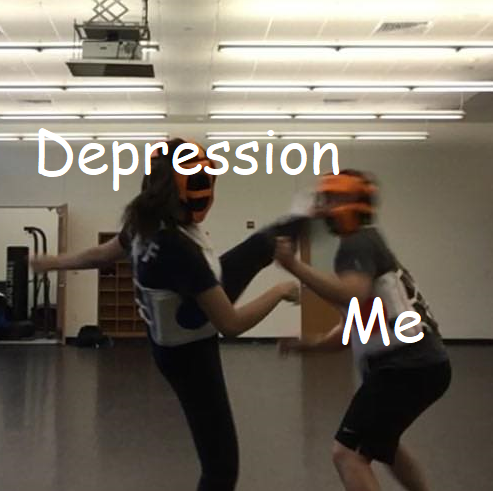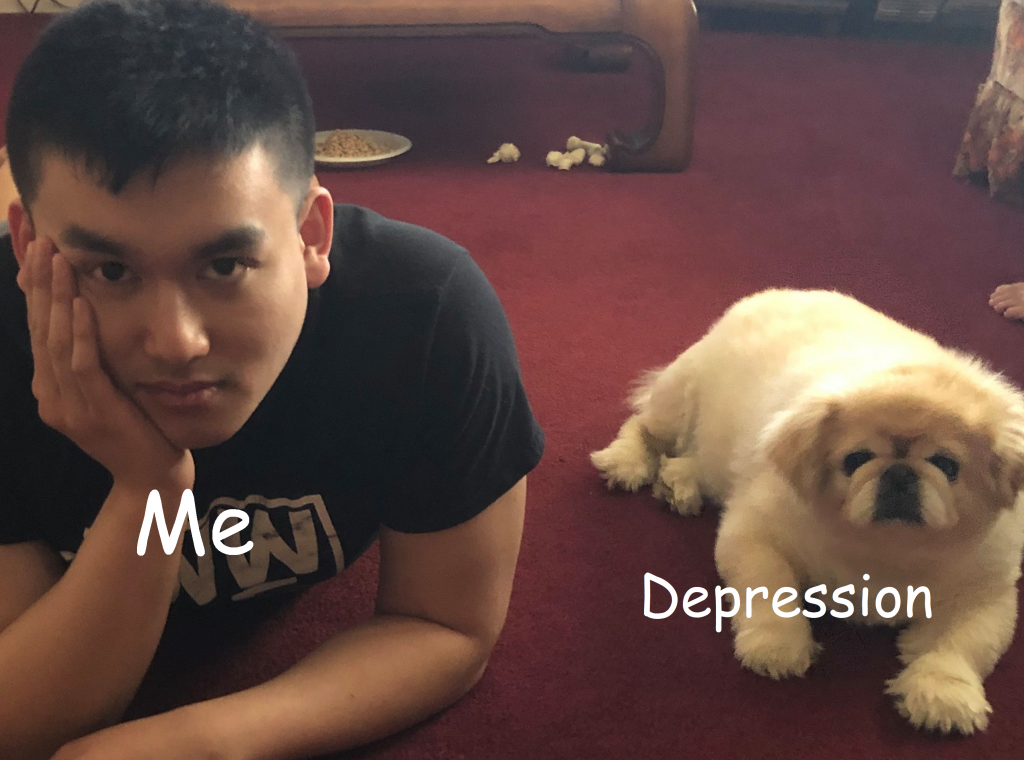Scholar Voices: 4 Tips for living and thriving with depression

Hey everyone, I’m Kevin, a recent alumnus of the Earl Woods Scholar Program. I graduated from Grinnell College in May 2019 with a degree in International Entrepreneurship. I have a job with Grinnell College’s career center as their digital media specialist, a supportive family and a wonderful girlfriend. I’ve also been diagnosed with major depressive disorder (MDD) and obsessive-compulsive disorder (OCD) which I’ve been managing for the past several years.
MDD is one of the most common mental disorders in the United States; around 7% of all U.S. adults have had at least one major depressive episode. Among the most prevalent demographics of MDD diagnoses are college students like Earl Woods Scholars. Individuals between 18-25 are more likely to have depression.
Based on my own experiences with depression, I’m hoping that some of these musings alongside tips I’ve learned along the way might help life for some of you look a little less like this, depression kicking me in the head…

and a little more like this, depression living side-by-side with me, like a puppy.

Disclaimer: I am not a doctor, and thus my opinions should not be treated as medical advice.
Ready? Let’s roll.
Tip #1 – Name the Issue, formally or informally
Depression, in a clinical sense, has to do with having a persistent “low mood” for two weeks or more in order to count as an “episode.” Symptoms, which often vary between patients, might include loss of interest in hobbies, constant fatigue or even irritability and anger. If you have access to a psychologist, getting formally diagnosed so that you know exactly what you’re dealing with might be an eye-opener for some. Depression is a treatable mood disorder.
If you can’t get diagnosed or would prefer a less clinically based approach, you might also choose to confide in clergy (perhaps a pastor or rabbi), friends and family or even professors or supervisors. Not everyone needs to formally say “my name is __________, and I have a major depressive disorder” to work on their mental health, but everyone does need to be aware of whether or not they’ve been feeling like themselves lately.
Tip #2 – Identify Cognitive Distortions
People with depression commonly experience “cognitive distortions,” or mental tie-ups that keep them from thinking rationally and smoothly. Most of the time I’ll just say I’m “in my feelings” during these times. If you’re able to identify these distortions, can mitigate depressive moods before they even start. There are a few common cognitive distortions that my “depressed self” has justified and my “healthy self” has refuted.
- All-or-nothing thinking
I love boxing and asked a few buddies to critique my form once. While they admired my hooks and tight guard, they believed I didn’t punch with enough power.
Depressed self says: Kevin, you’ve always been a clumsy nerd that will never learn how to fight. Just give up.
Healthy self says: Hm, that’s a fair critique. Or maybe it might even be unfair. We’ll see how my power translates in the ring.
- Magnification and Minimization
I received a scholarship from TGR foundation. I was ecstatic and wanted to tell my friends about my accomplishment.
Depressed self says: Good job Kevin, but you must’ve somehow gotten lucky to get that scholarship. Keep it to yourself.
Healthy self says: Sure, luck can play a role in life. But you worked hard to get where you are. Speak up.
- Should Statements
I’m stressed over work obligations and feel a bit irritable. My girlfriend wants to joke around, but I’m not in the mood.
Depressed self says: Ugh. My girlfriend shouldn’t be annoying me. I love her, so I shouldn’t be feeling like this right now.
Healthy self says: Hey Kevin, looks like you’re stressed. Maybe you need a quick break before you continue.
Tip #3 – Be unhealthy at healthy frequencies
Although depression is a mood disorder, it can also have many physical symptoms. For instance, you may be much more fatigued than normal. You may lose your appetite or you may want to eat more. Sometimes, you’ll need “bed days” on the weekends where you’ll allow yourself to stay in, watch Netflix and eat unhealthy food. Other times, you’ll find that you’re motivated to go outside and watch a movie with a friend. Know that neither version of yourself is the “real” you and both versions are your body’s way of re-balancing your sense of being so that you can aggressively heal from life’s various stressors.
Because depression brings lower energy levels, you not only need to have healing factors that engage your brain (like sports or socializing) but also practices that put it on standby (like sleeping or eating junk food), provided that the stand-by factors are used sparingly. For example, while I have a daily exercise routine, I usually eat cream cheese sushi with my girlfriend or have prolonged gaming sessions once every week so that I don’t burn out from trying to function like people with higher energy levels.

Tip #4 – Satisfaction, acceptance and moving forward
While depression is treatable, it’s not necessarily permanently curable. Even those who end an episode have a possibility of relapsing at any time. Objectively, this sucks. However, if depressed people like me often find themselves asking “what’s the point in all this?” when in their worst moods, then I challenge us to re-assign that phrase to our often complacent attitudes — what’s the point in continuing to wallow when you can have the best possible sucky mood rather than the worst possible sucky mood?
As long as we are still able to open our eyes today, there will always be room to pursue our curiosities, serve our loved ones (this can mean family, your significant other or even yourself) and continue to aggressively heal. We must be satisfied with losing some days or weeks or months, in the hope that we will win others. That’s life.
Bonus: Finding Therapy Resources
For those interested in finding clinical help for depression, the internet has proven invaluable to me in my own search. Click here to download some self-help resources.
Redefining what it means to be a champion.


